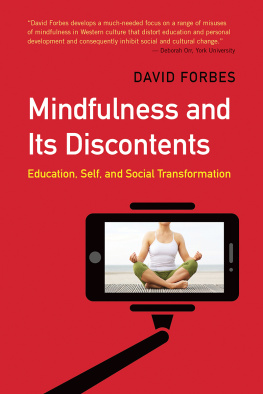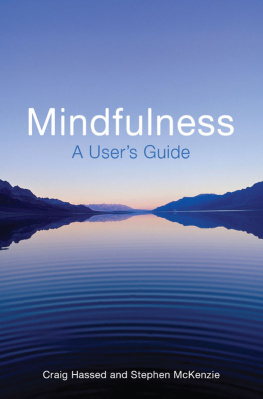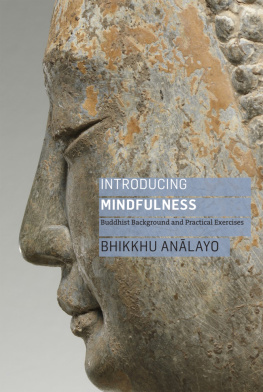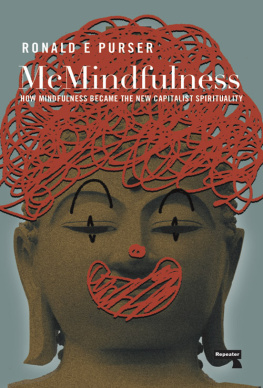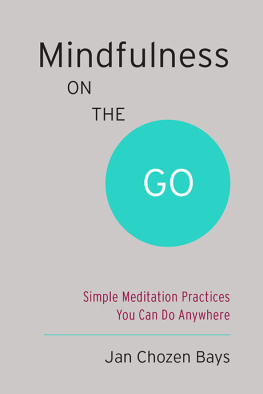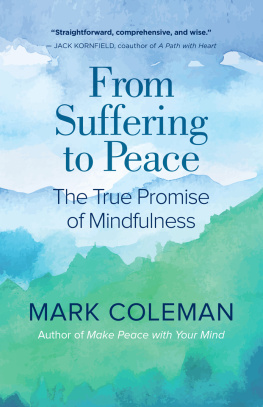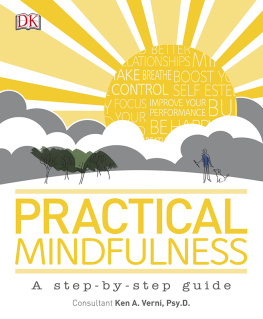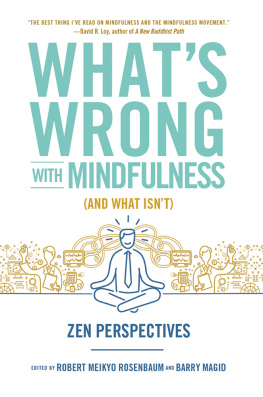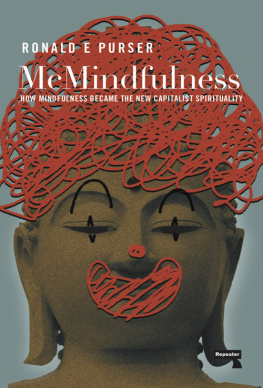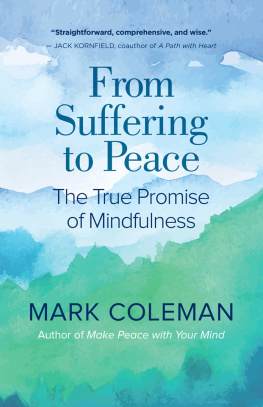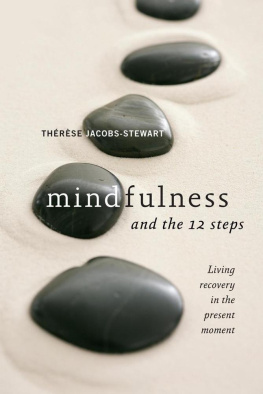Mindfulness and Its Discontents
Mindfulness and Its Discontents
Education, Self, and Social Transformation
DAVID FORBES
Fernwood Publishing
Halifax & Winnipeg
Copyright 2019 David Forbes
All rights reserved. No part of this book may be reproduced or transmitted in any form by any means without permission in writing from the publisher, except by a reviewer, who may quote brief passages in a review.
Editing: Jenn Harris
Cover design: Tania Craan
eBook: tikaebooks.com
Printed and bound in Canada
Published by Fernwood Publishing
32 Oceanvista Lane, Black Point, Nova Scotia, B0J 1B0
and 748 Broadway Avenue, Winnipeg, Manitoba, R3G 0X3
www.fernwoodpublishing.ca
Fernwood Publishing Company Limited gratefully acknowledges the financial support of the Government of Canada, the Canada Council for the Arts, the Manitoba Department of Culture, Heritage and Tourism under the Manitoba Publishers Marketing Assistance Program and the Province of Manitoba, through the Book Publishing Tax Credit, for our publishing program. We are pleased to work in partnership with the Province of Nova Scotia to develop and promote our creative industries for the benefit of all Nova Scotians.

Library and Archives Canada Cataloguing in Publication
Title: Mindfulness and its discontents : education, self, and social transformation / David Forbes.
Names: Forbes, David, 1949- author.
Description: Includes bibliographical references and index.
Identifiers: Canadiana (print) 20190062347 | Canadiana (ebook) 20190062398 | ISBN 9781773631165
(softcover) | ISBN 9781773631189 (EPUB) | ISBN 9781773631172 (Kindle)
Subjects: LCSH: Mindfulness (Psychology) | LCSH: Self-realization. | LCSH: EducationPsychological
aspects. | LCSH: Neoliberalism.
Classification: LCC BF637.M56 F67 2019 | DDC 158.1/3dc23
Contents
Acknowledgements
Grateful thanks to colleagues from far and wide who resist the hype and see both the perils and promise of mindfulness as a social practice; they have provided valuable ideas and encouragement along the way: Manu Bazzano, Beth Berila, Jenn Cannon, John Downing, Kristina Eichel, Paula Haddock, Kevin Healey, Funie Hsu, Ilmari Kortelainen, Rachel Lilley, Ram Mahalingham, Nomi Naeem, Deborah Orr, Steven Stanley, Julia Wahl, Zack Walsh, Jeff Wilson. Special thanks to my fellow mindful crank and friend, Ron Purser, who has helped steer me on course in the incorrect direction.
Much appreciation for the support of my colleagues at Brooklyn College: Geri DeLuca, Linda Louis, Karel Rose, Deb Shanley, Peter Taubman, and Barbara Winslow; William Helmreich at City College; and in the CUNY Graduate Center Urban Education Doctoral program, Kostas Alexakos, Gillian Bayne, Christine Saieh and Ken Tobin, whose support has been invaluable. Thank you to my students at both Brooklyn and the Grad Center who ground me and run with ideas in surprising and creative ways.
Members of my Brooklyn KM sangha kept me on the right emotional path during challenging times; gratitude to Stephanie Golden, Frannie Hoff, and Amy Selzer.
I am most fortunate to have worked with Candida Hadley, a gentle, skilful, and wise editor, at Fernwood Publishing. Jenn Harris is an extraordinary copyeditor and I feel very lucky to have had the benefit of her sure-handed expertise.
Family members Vicki Forbes and Richard Friesner, thank you for being there for me. And to Iris Lopez, to whom I dedicate this book, love always and forever, Im beyond grateful for your love and support.
Non/Song of My Non/Self
A child should be allowed to take as long as she needs for knowing everything about herself, which is the same as learning to be herself. Even twenty-five years if necessary, or even forever. And it wouldnt matter if doing things got delayed, because nothing is really important but being oneself. (Riding 1993: 15)
Since I was a child, I wanted to not just know and be myself, but to step outside and transcend myself. Who was I really? What did it mean when grown-ups told me to just be myself? Even when feeling conflicted and inauthentic, wasnt I still always myself? Later I pondered the question taken up by philosophers what is the nature of the self? And by Buddhists is there even a solid, unchanging self? The self I presented in everyday life often felt like a restrictive mask, one that I and others were supposed to wear and that few noticed and spoke (up) about. I was bothered by living in a consumerist society being expected to have the right clothes and material goods and couldnt help but see beneath and beyond the conventional surface of things. Was there something hidden about ones self? On our bookshelf at home was a first edition of The Little Prince, and like many children and adults I was drawn to its famous line: It is only with the heart that one can see rightly; what is essential is invisible to the eye. For many of us the book stands as a critique of a careless, frenetic planet of grown-ups who overvalue and try to control matters of unimportance, in need instead of full, heart-seeing presence, whether for a friend, a sunset, or a single rose.
At the same time, I sensed that here, in this time and place into which I was born, this historical, contingent, messy, glorious world, lay all the possible and actual ways I could create and live a transcendent life with others. I saw this as a sensuous, spiritual, and active way to be. One of my literary heroes, Tom Joad in The Grapes of Wrath, took to heart what Casy the preacher told him: Maybe a fella aint got a soul of his own, but ony a piece of a big one (Steinbeck 1977: 463). That big soul is all of human nature; Casy saw it as love itself. Tom Joad began to realize he was inseparable from others; he was able to let go of simply thinking about himself and his family and became dedicated to fighting for a decent and just world for all.
While I grew up with and continue to have many advantages of which I keep becoming more aware, through disposition and an upbringing in a progressive, internationalist, anti-racist household I developed a strong sense of social justice and empathy for the underdog. I have always felt that we must make the Earth a place that belongs to everyone because it does; that mean and selfish people need to be stopped; that deluded ones (sometimes myself included) need to be educated; and that humanity and the universe are made meaningful by some kind of absolute love that cant often be seen but is nonetheless right here with us. It was like the chicken soup Bessie Glass served her daughter Franny during her spiritual breakdown in J.D. Salingers story about the Zen-inspired Glass siblings. Frannys exasperated (and exasperating) brother Zooey asked her, How in hell are you going to recognize a legitimate holy man when you see one if you dont even know a cup of consecrated chicken soup when its right in front of your nose? (1961: 195). Virginia Woolf (1985: 72) wrote of the hidden yet self-evident design that links us and that we ourselves create: Behind the cotton wool is hidden a pattern; that we I mean all human beings are connected with this; that the whole world is a work of art; that we are parts of the work of art we are the words; we are the music; we are the thing itself.
As in Allen Ginsburgs Howl, I wanted to envision and bring forth the world as Holy! Everything is Holy! I was drawn to Walt Whitmans Song of Myself and other ambitious Whitmanesque writings infused with cosmic consciousness that strive to evoke the mystical, hidden sacredness of prophetic love within an embodied, diverse, and democratic everyday life. These included Hart Cranes The Bridge , James Joyces Ulysses , Ross Lockridge Jr.s novel, Raintree County, Frans Masereels wordless books , and William Blakes poem (and the English song), Jerusalem: I will not cease from mental fight, till we have built Jerusalem here . Garcia Lorca, in Ode to Walt Whitman (1955: 119), asked, Ah, filthy New York, / New York of cables and death. / What angel do you carry, concealed in your cheek? and I still want to know. I became intrigued with contemplative practices like Zen, which I felt could help me see the sacred within the ordinary world and realize that the self co-arises with everything else.

